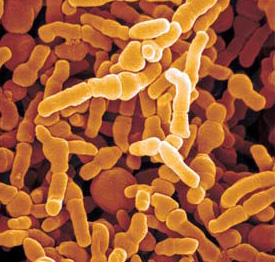About B. longum subsp. infantis
 B. infantis is a bifidobacterium that is found in the digestive tract of human infants. It is more accurately called Bifidobacterium longum subsp. infantis.
B. infantis is a bifidobacterium that is found in the digestive tract of human infants. It is more accurately called Bifidobacterium longum subsp. infantis.
Babies are born with a sterile gut but quickly develop their own population of bacteria acquired during the birthing process and then from their mother’s milk and other food sources.
Bifidobacteria are probiotics that naturally colonize in the human GI tract and vagina. They were first isolated over a hundred years ago from human feces. Bifidobacterium infantis is one of most important inhabitants in the human body.
Possible Benefits
Over recent years, a theory called the “hygiene hypothesis” proposes that the increase in allergic diseases, including asthma, atopic dermatitis, and atopic rhinitis in many developed countries is through the lack of early exposure to bacteria.
This bacterium is very helpful because it maintains a normal digestive tract, inhibits the growth of harmful bacteria, and also boosts the immune system (1). B. infantis keeps the digestive system running smoothly, blocks the growth of harmful bacteria, and boosts the immune system. The organism ferments sugars into lactic acid and has many health benefits for humans and is often the dominant bacterium found in humans. It is a Gram-positive, anaerobic, branched rod-shaped bacterium.
Researchers have identified a number of proteins that are specialised to help B. infantis interact with the human host and persist against harmful bacteria and future reseach will now closely look at which genes allow B. longum to live in different environments such as dairy products, vegetables and the human gastrointestinal tract.
Bifidobacterium infantis is among the first to colonize the sterile digestive tract of newborns and predominates in breast-fed infants. Formula-fed infants have a different microflora, and this may be related to the higher risk of diarrhea and allergies in these babies.
This type of bacteria is considered beneficial because of the acids it produces. The acids produced by Bifidobacterium infantis may help impede the growth or colonization of harmful bacteria within the colon. According to Medical News Today, Bifidobacterium infantis is “normal, friendly bacteria [that] play an important role in basic digestion, proper metabolism and overall well-being. [Bifidobacterium infantis] works within the digestive system to restore intestinal balance and maintain normal digestive health.”(1) According to to a study sponsored by P&G Health Sciences Institute and published in the American Journal of Gastroenterology, Bifidobacterium infantis may be beneficial to those that suffer from symptoms of irritable bowel syndrome (IBS) including bloating, gas, diarrhea, constipation, urgency and abdominal discomfort. You do have to take the results of this study with a grain of salt because P&G manufactures Align probiotic which contains B. infantis.
Sources:
Am J Gastroenterol. 2006 Jul;101(7):1581-90.
Efficacy of an encapsulated probiotic Bifidobacterium infantis 35624 in women with irritable bowel syndrome.


Leave a Reply
Privacy Policy: ProbioticsDB.com only uses your information to respond to any questions you may have. We will not contact you for any other purposes and will not sell, distribute, or disseminate your information.